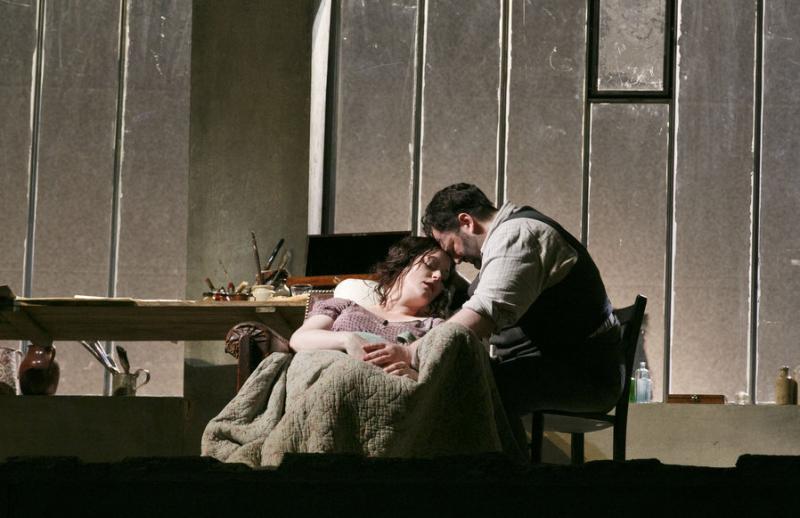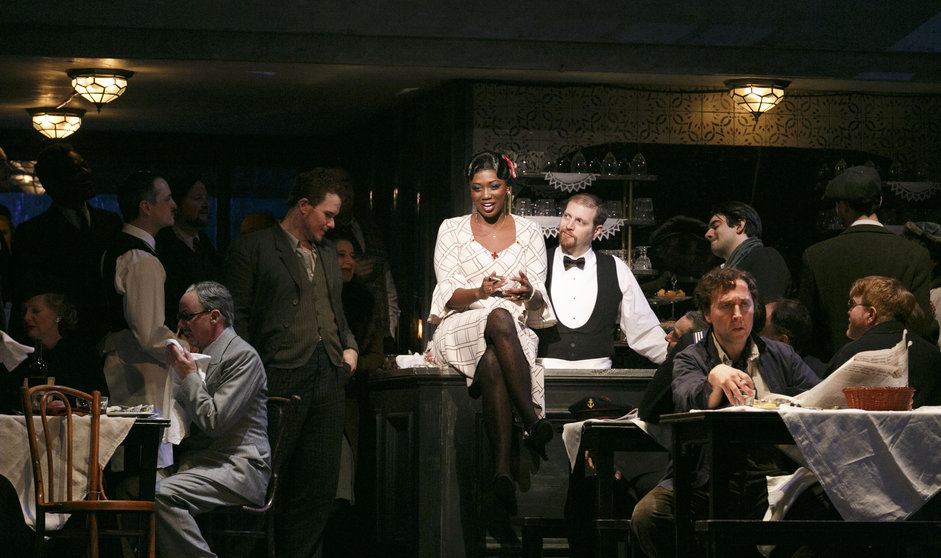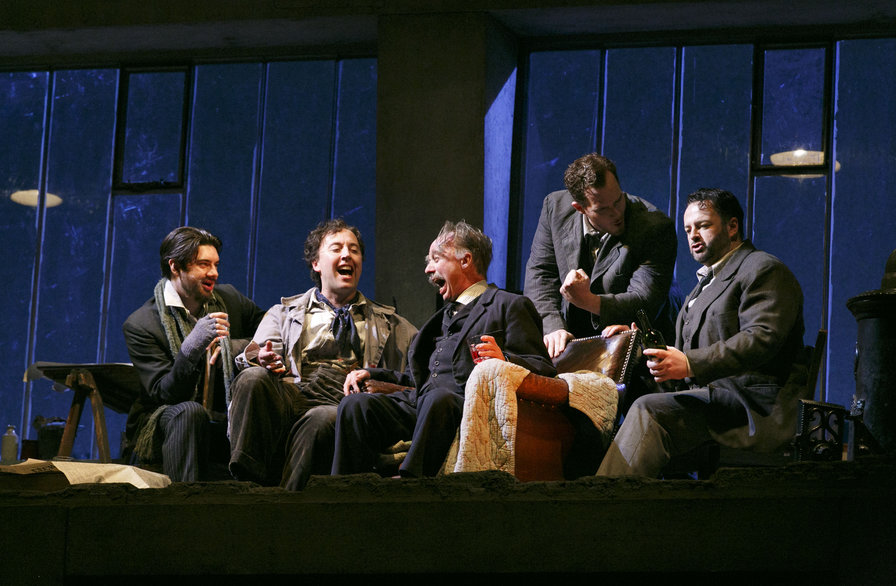La bohème, English National Opera | reviews, news & interviews
La bohème, English National Opera
La bohème, English National Opera
A Bohème of rare musical excellence that will please cynics and softies alike

I’m not one to get misty-eyed over La bohème (unless it be a red mist of rage), but this second revival of Jonathan Miller’s production at English National Opera brought me closer than any yet to understanding the snuffling, lip-quivering reactions of those around me in the Coliseum stalls. And if it wasn’t exactly emotion that got me there, then perhaps it was something even better: sentimental delight in joyous, glorious music-making.
La bohème has suffered more than most operas at the hands of clever directors and conceptual visions. But at this stage in his career Miller has nothing to prove, and it’s a relief and a pleasure to settle down into his production and Paris of the 1930s. I remember struggling with its slightly too-sanitised, too-pretty portrait of poverty back in 2010, but things seem to have toughened up just a bit in this latest revival directed by Natascha Metherell.
Gwyn Hughes Jones just gets better and better with every appearance at ENO
Mimi and Rodolfo may be about to unite under gentle snowfall and to some of Puccini’s most soaring music, but a prostitute unobtrusively plies her trade with a sailor in the background; Musetta (Angel Blue, pictured below) may be the toast of the Café Momus, but we still find her being pawed by an over-eager patron in a cheap bar. The Depression doesn’t scream here, but in the muted shades of Isabella Bywater’s designs its quiet desperations sidle and seep persistently into our consciousness.
 Only Amanda Holden’s translation strikes a jarring note – a rare misfire from ENO’s most reliably witty and skilled librettist. Dull syllables are stressed, vernacular phrases feel self-conscious and rhyming couplets force themselves upon our attention. But none of this detracts from the excellence of the finest quartet yet of leads in this production. Gwyn Hughes Jones (Rodolfo) just gets better and better with every appearance at ENO, relishing each leap and cherishing every vaulting top note, with “O Mimi, tu piu non torni” in his sights from the very start.
Only Amanda Holden’s translation strikes a jarring note – a rare misfire from ENO’s most reliably witty and skilled librettist. Dull syllables are stressed, vernacular phrases feel self-conscious and rhyming couplets force themselves upon our attention. But none of this detracts from the excellence of the finest quartet yet of leads in this production. Gwyn Hughes Jones (Rodolfo) just gets better and better with every appearance at ENO, relishing each leap and cherishing every vaulting top note, with “O Mimi, tu piu non torni” in his sights from the very start.
Thanks to Oleg Caetani in the pit speeds are defiantly swift, lending an urgency and matter-of-factness to proceedings that cuts nicely against any lingering sentimentalism there might be about the opera. His surging, warmly enthusiastic orchestra (occasionally just a touch too dominant) carries us along through romance and tragedy almost before we’re ready for it – an approach that might not fly with the self-indulgent big-names up at Covent Garden, but works a treat here with a young cast (two major role debuts among them).
 Kate Valentine’s Mimi is a genuine innocent – quite a shift from Elizabeth Llewellyn’s rather more knowing ingénue previously – and deliciously ardent with it. Less controlled than her Countess in ENO’s recent Figaro, Mimi feels like a role she may never play better dramatically but vocally will only gain colour and nuance from repetition. Also making his role debut is Richard Burkhard’s Marcello, leading the all-male scenes (pictured left) with warmth of tone and some beautiful phrasing, and managing not to be entirely eclipsed by Angel Blue’s Musetta – quite the feat.
Kate Valentine’s Mimi is a genuine innocent – quite a shift from Elizabeth Llewellyn’s rather more knowing ingénue previously – and deliciously ardent with it. Less controlled than her Countess in ENO’s recent Figaro, Mimi feels like a role she may never play better dramatically but vocally will only gain colour and nuance from repetition. Also making his role debut is Richard Burkhard’s Marcello, leading the all-male scenes (pictured left) with warmth of tone and some beautiful phrasing, and managing not to be entirely eclipsed by Angel Blue’s Musetta – quite the feat.
It’s hard to imagine a more natural Musetta than the charismatic Blue, who sounds almost as good as she looks doing it. Fuller and heavier in her upper register than some, hers is the performance that really balances up to the ENO Orchestra in full flow, less the brittle seductress than a shrewd woman of the world who knows exactly how to play the game. Simon Butteriss returns to steal the scene with his cockney Benoit (“I may be old but I’m still randy!”), and Duncan Rock rounds out the young artists as a dynamic Schaunard.
ENO are at their best when experimenting, when taking risks and defending their very different role and mission to the Royal Opera. It’s been a tough few months for them though, and while they gather themselves for the next big push of concept and technology-driven works it’s a pleasure to be able to relax into such an accomplished, enjoyable production. Jonathan Miller’s bohème isn’t a game-changer in the showy, PR sense, but if its gentle realism and blindingly good music can persuade some first-time opera-goers to take a risk on another show, then it really doesn’t need to be.
rating
Explore topics
Share this article
Add comment
The future of Arts Journalism
You can stop theartsdesk.com closing!
We urgently need financing to survive. Our fundraising drive has thus far raised £49,000 but we need to reach £100,000 or we will be forced to close. Please contribute here: https://gofund.me/c3f6033d
And if you can forward this information to anyone who might assist, we’d be grateful.

Subscribe to theartsdesk.com
Thank you for continuing to read our work on theartsdesk.com. For unlimited access to every article in its entirety, including our archive of more than 15,000 pieces, we're asking for £5 per month or £40 per year. We feel it's a very good deal, and hope you do too.
To take a subscription now simply click here.
And if you're looking for that extra gift for a friend or family member, why not treat them to a theartsdesk.com gift subscription?
more Opera
 The Railway Children, Glyndebourne review - right train, wrong station
Talent-loaded Turnage opera excursion heads down a mistaken track
The Railway Children, Glyndebourne review - right train, wrong station
Talent-loaded Turnage opera excursion heads down a mistaken track
 La bohème, Opera North review - still young at 32
Love and separation, ecstasy and heartbreak, in masterfully updated Puccini
La bohème, Opera North review - still young at 32
Love and separation, ecstasy and heartbreak, in masterfully updated Puccini
 Albert Herring, English National Opera review - a great comedy with depths fully realised
Britten’s delight was never made for the Coliseum, but it works on its first outing there
Albert Herring, English National Opera review - a great comedy with depths fully realised
Britten’s delight was never made for the Coliseum, but it works on its first outing there
 Carmen, English National Opera review - not quite dangerous
Hopes for Niamh O’Sullivan only partly fulfilled, though much good singing throughout
Carmen, English National Opera review - not quite dangerous
Hopes for Niamh O’Sullivan only partly fulfilled, though much good singing throughout
 Giustino, Linbury Theatre review - a stylish account of a slight opera
Gods, mortals and monsters do battle in Handel's charming drama
Giustino, Linbury Theatre review - a stylish account of a slight opera
Gods, mortals and monsters do battle in Handel's charming drama
 Susanna, Opera North review - hybrid staging of a Handel oratorio
Dance and signing complement outstanding singing in a story of virtue rewarded
Susanna, Opera North review - hybrid staging of a Handel oratorio
Dance and signing complement outstanding singing in a story of virtue rewarded
 Ariodante, Opéra Garnier, Paris review - a blast of Baroque beauty
A near-perfect night at the opera
Ariodante, Opéra Garnier, Paris review - a blast of Baroque beauty
A near-perfect night at the opera
 Cinderella/La Cenerentola, English National Opera review - the truth behind the tinsel
Appealing performances cut through hyperactive stagecraft
Cinderella/La Cenerentola, English National Opera review - the truth behind the tinsel
Appealing performances cut through hyperactive stagecraft
 Tosca, Royal Opera review - Ailyn Pérez steps in as the most vivid of divas
Jakub Hrůša’s multicoloured Puccini last night found a soprano to match
Tosca, Royal Opera review - Ailyn Pérez steps in as the most vivid of divas
Jakub Hrůša’s multicoloured Puccini last night found a soprano to match
 Tosca, Welsh National Opera review - a great company reduced to brilliance
The old warhorse made special by the basics
Tosca, Welsh National Opera review - a great company reduced to brilliance
The old warhorse made special by the basics
 BBC Proms: The Marriage of Figaro, Glyndebourne Festival review - merriment and menace
Strong Proms transfer for a robust and affecting show
BBC Proms: The Marriage of Figaro, Glyndebourne Festival review - merriment and menace
Strong Proms transfer for a robust and affecting show
 BBC Proms: Suor Angelica, LSO, Pappano review - earthly passion, heavenly grief
A Sister to remember blesses Puccini's convent tragedy
BBC Proms: Suor Angelica, LSO, Pappano review - earthly passion, heavenly grief
A Sister to remember blesses Puccini's convent tragedy

Comments
The notion that translation
Both writer and commenter
Sentimentalist, The
That's subjective. The reason
I went to see 'Boheme' (with